2021
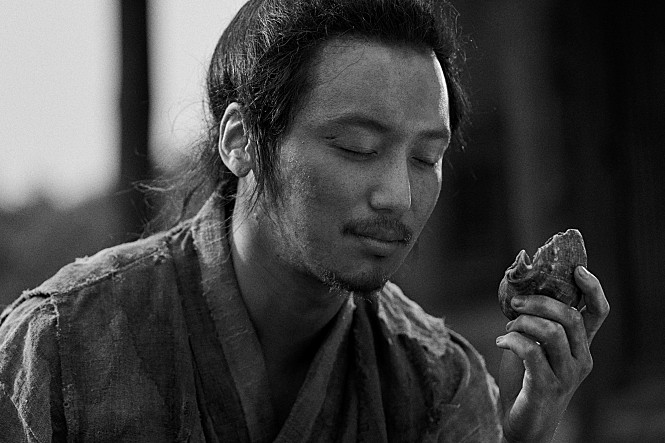
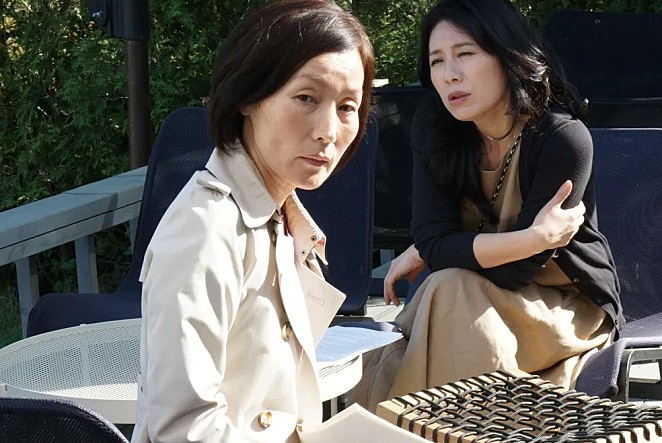
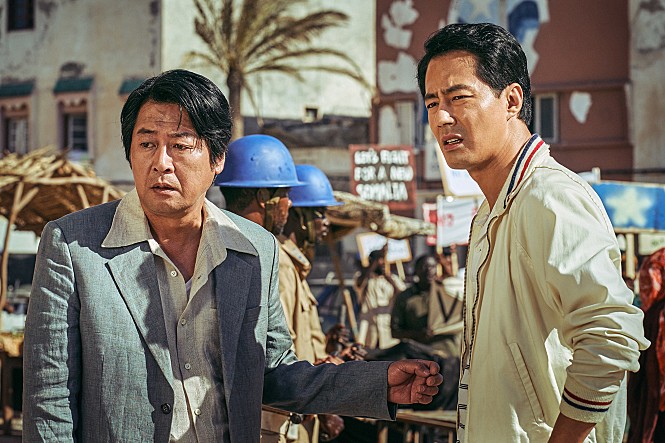
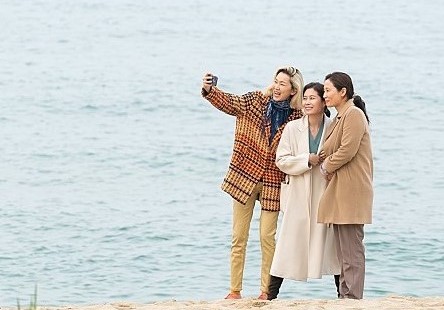
"The Book of Fish", "In Front of Your Face", "Escape From Mogadishu", "Three Sisters"
The Korean film industry remained very much in the grip of the pandemic in the year 2021. Although big-budget Hollywood features -- mostly absent from the 2020 lineup -- returned with some degree of box-office success, most local distributors continued to hold back their higher-profile releases of Korean films. The year would end with Korean cinema taking roughly a 30% market share, the lowest in over two decades.
The highest grossing local release of the year was Ryoo Seung-wan's Escape From Mogadishu, released in the summer despite rising numbers of COVID cases. The film's total box-office of 3.6 million admissions was grounds for cautious optimism, but other Korean releases (many of which were released simultaneously on streaming platforms) did not perform as well. Hopes for a strong Christmas/New Year's box office season to end the year were dashed by the country's highest spike of COVID cases to date, although Spider-Man: No Way Home proved successful regardless.
In other news, Hong Sangsoo's Introduction won a Best Screenplay award at Berlin, and his subsequent feature In Front of Your Face also received an invitation to screen in a non-competitive section at Cannes. Youn Yuh-jung became the first Korean actor to win an Oscar, with her acclaimed performance in the American film Minari. But the biggest news of the year was the global success of Netflix series Squid Game, which even further raised the bar on what is possible for Korean content to achieve.
Reviewed below: Three Sisters (Jan 27) - Slate (Apr 8) - Escape From Mogadishu (Jul 28) - Hostage: Missing Celebrity (Aug 18) - Miracle: Letters to the President (Sep 15) - Perhaps Love (Nov 17).
| Korean Films | Admissions | Release | Revenue | |
|---|---|---|---|---|
| 1 | Escape From Mogadishu | 3,613,981 | Jul 28 | 34.6bn |
| 2 | Sinkhole | 2,195,683 | Aug 11 | 21.4bn |
| 3 | Hostage: Missing Celebrity | 1,638,437 | Aug 18 | 15.6bn |
| 4 | On the Line | 1,426,357 | Sep 15 | 14.0bn | 5 | Hard Hit | 955,809 | Jun 23 | 9.1bn | 6 | The Medium | 834,338 | Jul 14 | 8.6bn |
| 7 | Spiritwalker | 810,673 | Nov 24 | 9.1bn |
| 8 | Miracle | 715,877 | Sep 15 | 6.6bn |
| 9 | Nothing Serious | 605,057 | Nov 24 | 6.1bn |
| 10 | Perhaps Love | 518,070 | Nov 17 | 5.2bn |
| All Films | Admissions | Release | Revenue | |
|---|---|---|---|---|
| 1 | Spider-Man: No Way Home (US) | 7,467,781* | Dec 15 | 63.2bn |
| 2 | Escape From Mogadishu (Korea) | 3,613,981 | Jul 28 | 34.6bn |
| 3 | Eternals (US) | 3,050,015 | Nov 3 | 31.7bn |
| 4 | Black Widow (US) | 2,962,088 | Jul 7 | 30.1bn |
| 5 | Fast & Furious 9 (US) | 2,292,413 | May 19 | 22.1bn |
| 6 | Sinkhole (Korea) | 2,195,683 | Aug 11 | 21.4bn |
| 7 | Demon Slayer (Japan) | 2,151,861 | Jan 27 | 20.7bn |
| 8 | Venom: Let There Be Carnage (US) | 2,123,573 | Oct 13 | 21.1bn |
| 9 | Soul (US) | 2,048,228 | Jan 20 | 19.0bn |
| 10 | Cruella (US) | 1,193,396 | May 26 | 19.3bn |
* Includes admissions from 2022. Revenue is in Korean currency (US$1=~1200 won).
Source: Korean Film Council (www.kobis.or.kr).
Seoul population: 9.8 million
Nationwide population: 51.8 million
I will not begin this view by enumerating how many movies with the title Three Sisters already exist in the world. Probably more than a few, even if they are not all adaptations of Anton Chekhov's play. In any case, the films depicting three sisters with distinct characters living under the same roof and the conflicts generated among them seem to almost constitute a genre of its own.
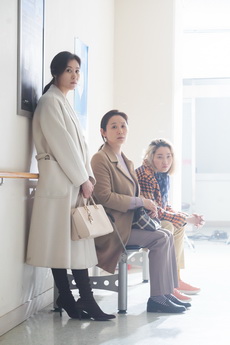 Director Lee Seung-won's new film makes use out of this familiar trope. The sisters here are played by Kim Sun-young (Miss Baek), Moon So-ri (Little Forest) and Jang Yoon-ju (Veteran), respectively. As you might have guessed at the outset, in this film the casting of these three actresses and the characters they play are far more important than any plot development. According to the grapevine, the original plan for casting had Kim Sun-young playing the youngest sister, indicating that the sisters had belonged to a noticeably older age cohort. However, casting of Moon, one of the biggest female stars in Korean cinema, as one of the sisters apparently necessitated lowering of their ages. By the way, director Lee is married to Kim Sun-young (they have been co-managers of a theatrical company for more than a decade).
Director Lee Seung-won's new film makes use out of this familiar trope. The sisters here are played by Kim Sun-young (Miss Baek), Moon So-ri (Little Forest) and Jang Yoon-ju (Veteran), respectively. As you might have guessed at the outset, in this film the casting of these three actresses and the characters they play are far more important than any plot development. According to the grapevine, the original plan for casting had Kim Sun-young playing the youngest sister, indicating that the sisters had belonged to a noticeably older age cohort. However, casting of Moon, one of the biggest female stars in Korean cinema, as one of the sisters apparently necessitated lowering of their ages. By the way, director Lee is married to Kim Sun-young (they have been co-managers of a theatrical company for more than a decade).
None of the three sisters in this film is a spinster. They are married, yet, unfortunately, remain unhappy in different ways. Hee-sook (Kim), the eldest, has shrunken into herself, having to take care of an indifferent husband and a callous daughter. Mi-yeon (Moon), the middle sister, seems to be doing better, married to a college professor and volunteering for a church choir. However, she is quietly disintegrating inside as well. The youngest, Mi-ok, recently married to a much older spouse who runs a wholesale business, is a playwright suffering from a creativity draught. Their stories are told in parallel threads, despite their occasional visits to one another, until almost the one and a half hour point, wherein these threads rapidly converge into a knot.
To be honest, it is not always easy to be sympathetic to these characters. I have earlier stated that the sisters remain unhappy in different ways: but they are unpleasant in different ways as well. Their unhappiness reflects in many ways their own unique brands of self-deception, obtuseness and cruelty. Therefore, Three Sisters is best enjoyed when we observe their behaviors from a slightly detached, perhaps even sadistic vintage point, rather than attempting to fully emphasize with their (largely self-induced) plights. The acting prowess of the three excellent female performers is best showcased in articulating for us their unpleasant qualities and the sufferings generated from these qualities.
In a way, the film works best when approached as an exposé of moral hypocrisies, self-delusional violence and willful ignorance of some middle-class Protestant families in South Korea, with Mi-yeon in particular a fervent churchgoer and other family members unable to shake the influence of the Protestant Christian milieu on their lives. Anyone who has a traumatic experience with the dark side of this particular milieu might have to stifle a scream or shout of anger at several points while watching the movie. Director Lee's screenplay was either rooted in this world or incorporated a significant amount of input from those knowledgeable about what it was like to grow up in it (Lee describes himself as "someone who dabbled in churchgoing as a kid," and both Kim Sun-young and Jang Yoon-ju identify themselves as Protestant Christians. Ironically, Moon So-ri, who plays the most enthusiastic Christian believer, is a Buddhist in real life).
The film meets a turning point once the sisters visit their hometown to celebrate their father's birthday. The dramatic screw gets tightened, as the dark truths about their pasts are exposed. These secrets in many ways serve to explain their current unpleasant qualities, but the movie does not really subscribe to a neat cause-and-effect scheme: after all, there are other factors than childhood experiences that ultimately determine the trajectory of a person's life. At any rate, the explosive effects of these revelations lead to a suitably cathartic ending for the viewers, albeit one less than satisfactory for the characters themselves.
Personally, I feel that the movie could have expanded on the second half of the narrative. There are certain exhibitionist qualities to the lives of the three sisters presented in a detailed manner in the first half. The actresses give excellent performances in their respective roles, and the clinical, detached exploration of their lives undoubtedly piques the viewer's voyeuristic pleasure. Nonetheless, it would have been better if these superb actresses were given more chances to interact with one another. Such a choice could have opened up the characters, rather stiflingly arrested in their own shells throughout the film, to new possibilities. When all is said, this feels like a bit of a missed opportunity. (Djuna, translated by Kyu Hyun Kim)
Cha Yeon-hee (An Ji-hye, Our Body) is a young female stuntwoman. Born to an actor-father who never made it and having grown up in an orphanage, Yeon-hee dreams of nabbing a starring role in a movie by showing off her martial arts skills. After years of hard work and self-promotion, she is finally hired as a stand-in for the female star in a major film production. Having arrived in a supposedly haunted open set, Yeon-hee messes with what looks like a Joseon-dynasty version of a clapper (called "slate" in Korea), unwittingly opening up a portal into a parallel universe, wherein South Korea is apparently divided into feudal clans and overrun by sword-wielding gangs. Yeon-Hee is mistaken for a mythical superhero Demon Slayer by the harassed villagers and their "mayor" Jina (Lee Min-ji, The Vanished) and is pressed to defend them against the supervillain Tae Pyeong-so (Park In-soo, The Tiger) and his colorful underlings, including Priest (he is called "Priest" in Korean too: Lee Se-ho, The Boys Who Cried Wolf), a practitioner of black magic, Philip, a scowling backstabber (Park Tae-san, Ashfall) and Rattlesnake, a pigtailed cutie armed with poison-tipped knives (Nam I-seul). Complicating the matter is the fact that real Demon Slayer (Jo Sun-gi, Gang) has arrived at the village and is not about to let the imposter steal the limelight from him.
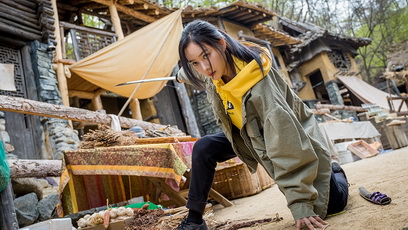 Slate is a brainchild of the young director Jo Ba-reun, noticed for his short film Vibration at the 2017 Bucheon Fantastic Film Festival, and previously helmed a grungy, no-budget schoolyard actioner Gang (2019). It is the kind of film both extremely Korean in flavor, orientation and attitude and rather unusual among the recently released roster of Korean films, in its seemingly incongruous mélange of an earnest, starry-eyed meta-cinematic fantasy about the joys and heartbreaks of filmmaking, a straight-laced low-budget martial arts action film in a low-rent Mortal Kombat mold and an equally heartfelt Bildungsroman centered on a heroine grappling with her desire to always remain at the center of the narrative.
Slate is a brainchild of the young director Jo Ba-reun, noticed for his short film Vibration at the 2017 Bucheon Fantastic Film Festival, and previously helmed a grungy, no-budget schoolyard actioner Gang (2019). It is the kind of film both extremely Korean in flavor, orientation and attitude and rather unusual among the recently released roster of Korean films, in its seemingly incongruous mélange of an earnest, starry-eyed meta-cinematic fantasy about the joys and heartbreaks of filmmaking, a straight-laced low-budget martial arts action film in a low-rent Mortal Kombat mold and an equally heartfelt Bildungsroman centered on a heroine grappling with her desire to always remain at the center of the narrative.
Sounds more than a little naïve or even saccharine? Thankfully, Slate does not pour the sentimental sap all over the place as some other films of this kind are wont to. It is too busy arranging and presenting swordfights. The overall impression is a throwback to the kind of early '00s genre cinema, say, the early works of Ryoo Seung-wan and Jang Joon-hwan (both are referenced throughout the film: a YouTube paranormal researcher played by Jung Jin-woo is even dressed exactly like Shin Ha-gyun in Save the Green Planet!), graced with a similar type of can-do spirit and homespun action sequences. Jo even manages to thread through the movie a coherent theme, a sly but earnest criticism of the Social Darwinist philosophy of "only the strong deserves to survive," which many twenty- and thirty-something Koreans feel underlie the surface progressivism espoused by their so-called "586" generation elders, the Korean equivalent of "Boomers" in the US.
The characters are winningly plucky and positive in outlook. An Ji-hye, for whom Jo allegedly wrote the character of Yeon-hee, is quite attractive in the role of the heroine. She has the kind of crisp, fresh appeal that refuses to turn soggy even dipped in a melodramatic situation, and looks fabulous zipping and zapping her sword in a series of acrobatic moves without the help of a stand-in. I certainly hope to see her in many more, possibly bigger projects in the future. Unfortunately, Jo, like many of his Korean contemporaries, does not seem to know how to construct fascinating or riveting villains. They are all colorful (-ly dressed and coiffed, in a ragtag, pseudo-'80s Hong Kong cinema kind of way) to be sure, but have a distinct flavor of scrungy, B-level video game icons with a rather limited range of functions.
Slate is a movie I would love to root for: it has a refreshing premise, an attitude that nicely balances tongue-in-cheek genre geekdom (I loved details such as the masked, black-clad underlings of Priest making squeaky, duck-like noises in lieu of human voices, a la the "combat personnel" from the Kamen Rider series, and the ways in which self-important, domineering figures— the head villain Tae Pyeong-so, for one— in the fantasy dimension are consigned to the minor roles in the "real life" one— the same actor appears as a snack cart owner barely noticed by Yeon-hee) with sincere love for filmmaking and a slew of attractive actors spearheaded by An Ji-hye.
However, the hard-nosed critic in me is compelled to point out that the film suffers from some defects, more evident if compared to the similarly low-budget genre films concocted by the likes of Ryoo Seung-wan. Even though Jo's screenplay does not waste much time on spurious descriptions of the fantasy realm, the latter's jerry-rigged, abandoned-movie-set allure gets quickly exhausted once the main narrative is on the way. For most of the film, the characters appear to be merely playacting the denizens of an alternative world than actually living in it, which might have been a directorial intention given the (no doubt) tiny budget, nonetheless hampering our investment in the heroine's predicament.
More importantly, the action choreography itself is busy enough but does not quite grab you. It is true that I have previously expressed displeasure at the Asia Extreme excessiveness of such Korean films as, say, The Villainess, but Slate has the opposite problem. The latter's action is neither particularly graceful nor viciously attention-grabbing. It would have helped if the villains were given some interesting attributes that went beyond their lugubriously predictable "villainous" qualities. Likewise, Jo Sun-gi's Demon Slayer is a missed opportunity: he ends up being redundant, neither a credible threat to Yeon-hee nor a senior super-hero who can show her the ropes.
Despite these problems, I would still recommend Slate to fans of Korean genre cinema, albeit with carefully calibrated expectations. Think of it as a minor-league meta-cinematic exercise in micro-budget genre filmmaking, its considerable if somewhat B-grade charm perfectly represented by its key prop, a Joseon-dynasty-style clapper, which also allows you to travel inter-dimensionally to a movie-world. Like it, Jo Ba-reun's film is ridiculous and chintzy but, if taken with the right frame of mind, somehow capable of bringing a smile to an Asian/Korean movie fan's face. (Kyu Hyun Kim)
North and South Korea were engaged in various heated diplomatic struggles during the 20th century, but in the early 1990s, one of the key points of contention involved membership in the United Nations. South Korea wanted desperately to become a UN member, but North Korea objected, arguing that neither country should be admitted until they were re-unified. Ultimately, the issue would be decided by a vote among member nations, which is why South Korea launched an aggressive campaign to open more embassies in Africa, and to lobby for those governments' support.
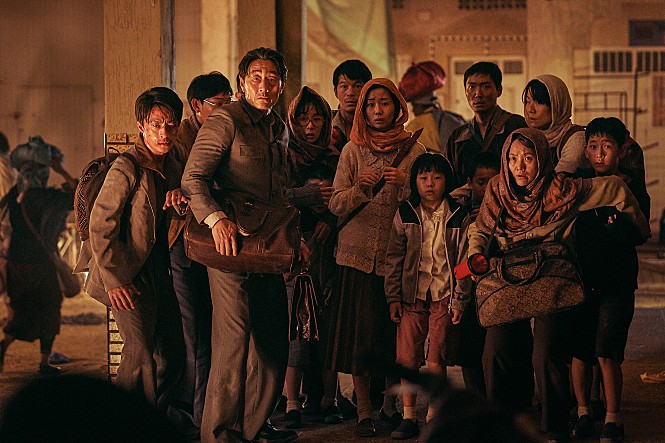 Escape From Mogadishu, based on a true story, is set in Somalia in late 1991, when Ambassador Han Shin-sung and his small team at the South Korean embassy are frantically trying to win over the loyalty of the corrupt Siad Barre regime. They make the best of their limited resources, but their bitter rivals in the North Korean embassy, who have been active in Africa for decades, are easily able to anticipate and block their every move.
Escape From Mogadishu, based on a true story, is set in Somalia in late 1991, when Ambassador Han Shin-sung and his small team at the South Korean embassy are frantically trying to win over the loyalty of the corrupt Siad Barre regime. They make the best of their limited resources, but their bitter rivals in the North Korean embassy, who have been active in Africa for decades, are easily able to anticipate and block their every move.
However one day in December, rebel forces storm the city. As panic spreads, government officials assure the diplomats that order will be restored quickly. But instead, vicious street fighting breaks out and the city is turned into a battleground. As the rebels gain the upper hand, the embassies are in particular danger, as they are seen to be allies of the crumbling regime. Ambassador Han starts making plans to flee the city with his staff, when suddenly he hears shouts from outside the embassy gates. It is the North Korean diplomats, desperate and asking for help.
No other filmmaker in Korea has such instinctive flair for the staging of large-scale spectacle as director Ryoo Seung-wan. In Escape From Mogadishu he is working on a particularly wide canvas, capturing the disintegration of an entire city alongside the tension and drama of the lead characters' plight. Shot entirely in Morocco in the months before the start of the pandemic, the film feels startlingly realistic and features several astounding sequences that have become famous since its release, in particular a chase scene involving cars with books taped to their outsides in a makeshift attempt at bulletproofing.
Nonetheless, as much visual spectacle as there is on display, the film's primary focus is on the personal drama that plays out among the Korean characters. In particular, the actors playing the two ambassadors -- Kim Yun-seok as Ambassador Han and Huh Joon-ho as Ambassador Rim -- bring a weight and nuance to their roles that anchor the entire film. Popular star Zo In-sung and the up-and-coming actor Koo Kyo-hwan both convincingly portray hot-headed counselors from their respective intelligence services, and even the minor characters among the embassy staff are memorable.
In ordinary times, Escape From Mogadishu might have been assured to sell 10 million tickets or more at the Korean box office. Its blend of spectacle and drama is exactly the mix that local audiences of all ages respond to so strongly. Sadly the pandemic intervened, but even so, the 3.6 million tickets sold for this film make it the best selling Korean release of 2021. It was, in many ways, the film of the year. (Darcy Paquet)
In this latest thriller Hostage: Missing Celebrity, Hwang Jung-min attempts a particularly challenging role: he plays himself. As the film opens we see him taking part in a press conference to promote a new film, an action movie which he headlines together with co-star Park Sung-woong (who is also playing himself). After dinner, he sends his manager home and stops at the convenience store outside his apartment. So far, it recalls one of those tongue-in-cheek dramas like E J-yong's The Actresses or Moon So-ri's The Running Actress in which stars appear as themselves and lightly poke fun at their public and private personas.
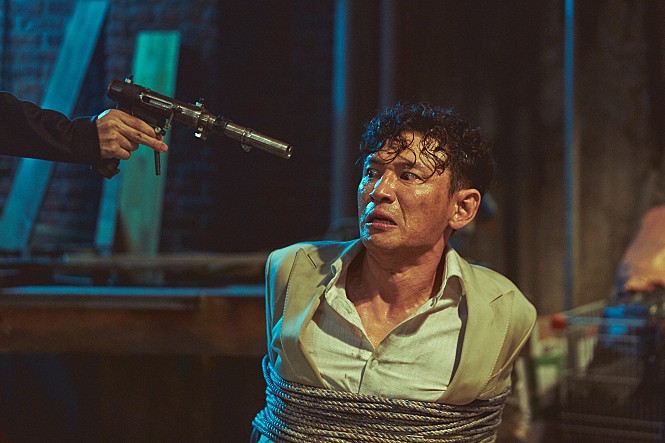 But then things take an unexpected turn. Hwang Jung-min gets kidnapped in the street and driven to a remote hideout in the countryside. The thugs who abducted him can scarcely believe their luck: right before their eyes is the celebrated star of Veteran and Ode to My Father, gagged and tied to a chair. As for Hwang himself, it's like suddenly he's been trapped in one of his own films. If he were unusually strong, or a skilled fighter, he might find some way to overpower his captors, break free and dash to safety. But that's the kind of thing that only happens in the movies.
But then things take an unexpected turn. Hwang Jung-min gets kidnapped in the street and driven to a remote hideout in the countryside. The thugs who abducted him can scarcely believe their luck: right before their eyes is the celebrated star of Veteran and Ode to My Father, gagged and tied to a chair. As for Hwang himself, it's like suddenly he's been trapped in one of his own films. If he were unusually strong, or a skilled fighter, he might find some way to overpower his captors, break free and dash to safety. But that's the kind of thing that only happens in the movies.
Hostage: Missing Celebrity by debut director Pil Gam-sung is undeniably a genre film, with numerous action setpieces, plenty of drama and a particularly impressive car chase. But at the same time it undercuts its own spectacle by playing with perceptions of reality, through the (real) character of Hwang Jung-min. The fact that lesser-known actors were cast in all the other roles helps to maintain the illusion (the effect would obviously not have been the same if Hwang Jung-min had been kidnapped by Choi Min-sik playing an ordinary person). And rather than being districting, this illusion of reality helps in creating a different sort of tension. So while it may seem at first like a gimmick, the casting of Hwang Jung-min as himself in a genre thriller ends up working rather well.
Writer-director Pil originally developed this feature as a remake of the 2015 Chinese thriller Saving Mr. Wu. That film featured Andy Lau as a kidnapped Hong Kong movie star (though the star in question was not named Andy Lau; he was a fictional character named Mr. Wu). Hostage has a different vibe, but it's a credit to the director that he was able to take this idea and do something unexpected with it.
Playing yourself in a film is probably a lot harder than it sounds. Hwang Jung-min manages to convincingly look like himself, rather than an actor playing himself. It's a nice irony that his character's only available weapon in this desperate situation is not his strength or physical ability, it's his acting skills. After all, we all know the power of acting to convince, captivate and deceive an audience. (Darcy Paquet)
![]() Miracle: Letters to the President
Miracle: Letters to the President
Miracle: Letters to the President is set in the 1980s, in a small mountainous village in a lesser-developed region of central Korea. With no roads linking the village to the outside world, the inhabitants are quite literally cut off from civilization. Although there is a train track which traverses the area, there is no station, so the train simply passes through without stopping. Villagers who need to visit neighboring towns do so by walking the tracks until they reach the nearest train station, a trek which takes hours in each direction.
Jun-gyeong is a 17-year old boy who has genius-level abilities in mathematics, but who struggles with social interactions and other academic subjects. Like the other villagers, he regularly walks the tracks, completing a 5-hour round trip each weekday in order to attend school. But the walk is not only long, it's dangerous, with tunnels and bridges that need to be crossed. Having witnessed terrible accidents himself, he devotes himself to the task of fixing this problem. The best solution, he believes, would be to build a train station at the edge of the village, so that villagers can board the train there and avoid the walk.
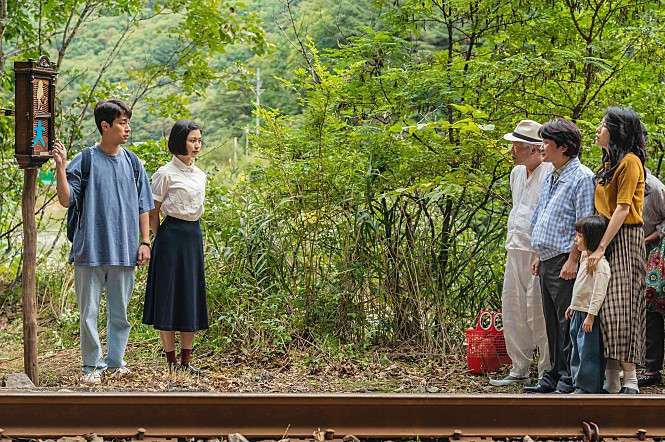 Jun-gyeong's idea is warmly supported by his older sister Bo-gyeong, someone with whom he shares a particularly deep connection. But his father, a withdrawn, uncommunicative man who still seems haunted by the death of his wife years earlier, discourages his son. A train conductor himself, he knows well the bureaucratic obstacles that stand in the way of such a plan, and just the mention of it seems to upset him. Ultimately it is one of his classmates at school -- a girl named Ra-hee from a rich family in a larger town -- who gives him the strongest encouragement, helping him maintain a letter campaign to the office of the president.
Jun-gyeong's idea is warmly supported by his older sister Bo-gyeong, someone with whom he shares a particularly deep connection. But his father, a withdrawn, uncommunicative man who still seems haunted by the death of his wife years earlier, discourages his son. A train conductor himself, he knows well the bureaucratic obstacles that stand in the way of such a plan, and just the mention of it seems to upset him. Ultimately it is one of his classmates at school -- a girl named Ra-hee from a rich family in a larger town -- who gives him the strongest encouragement, helping him maintain a letter campaign to the office of the president.
Although it has been fictionalized to some degree, Miracle: Letters to the President is based on a real-life story which is just as remarkable as the events depicted in the film. The character of Jun-gyeong too is based on a real person. Although his prodigious talent in math set him apart from other people, the film also shows that it was his generosity of spirit and deep connection to his hometown that may have been his most remarkable quality.
Miracle is the second film by director Lee Jang-hoon, who showed an unusual talent for melodrama in his 2018 debut Be With You. In this film too he mixes humor and a sweet nostalgic tone with some moments that hit the viewer with considerable force. In previous decades, the melodrama genre used to be a mainstay of Korean cinema, but in today's industry it has been mostly relegated to the sidelines. In that sense, it has been encouraging to see the emergence of a director who can bring the genre to a new level.
The four leading actors at the center of this film also deserve much praise. Park Jeong-min (Deliver Us From Evil) has established himself as one of the most sought-after male actors of his generation, and in this film he disappears fully into the role of Jun-gyeong, giving it much depth (though it's a bit disconcerting to see a 34-year old man take on the role of a 17-year old boy). K-pop star Im Yoona (formerly of Girls Generation, who also starred in the film Exit) once again demonstrates her onscreen charisma in the role of Ra-hee. The veteran Lee Seong-min, playing the father, gives a performance that initially seems too restrained, until it comes forth in the dramatic twists of the final reel. But perhaps the most affecting performance is the actor who receives fourth billing: Lee Soo-kyung (The Odd Family - Zombie on Sale) as Jun-gyeong's sister. These two siblings make the screen come alive in every one of their scenes, and it's what viewers may remember most about this sad but uplifting film. (Darcy Paquet)
There is a quite a complicated web of tangled relationships in Perhaps Love, but let's start with Hyun, a celebrated novelist whose life is falling apart. Several years earlier he published a novel that made him famous and beloved by readers across Korea. But perhaps because of the added pressure that comes from fame and expectation, or perhaps because he's losing the ability to focus, he has been unable to even start his next book. Enough time has passed that people are beginning to whisper. Soon-mo, who is his best friend and his publisher, is growing desperate.
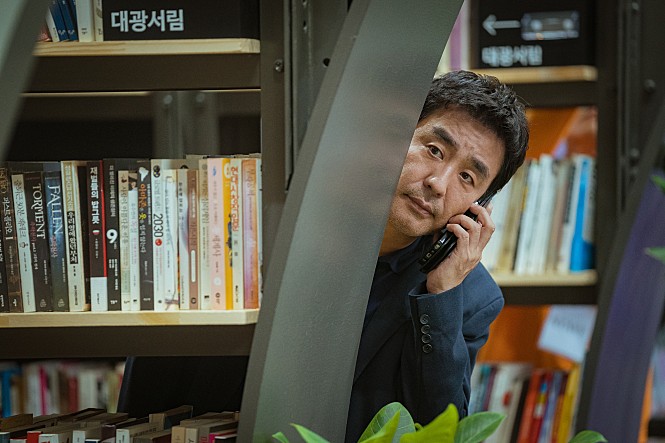 But Hyun's personal life is no less precarious. His second wife and young daughter are in the U.S., and Hyun, feeling a bit lost without them, starts to rely more and more on his ex-wife Mi-ae, with whom he has a teenage son. One day their emotions spill somewhat out of control, leading to a very awkward situation. But things are even more complicated than Hyun realizes, because Mi-ae and his best friend Soon-mo are secretly dating. Mi-ae and Hyun's sensitive son Seong-gyeong, meanwhile, is more than a little freaked out by his parents' love lives, but then he too gets to know the woman who lives next door and falls headlong into his own sort of romantic confusion.
But Hyun's personal life is no less precarious. His second wife and young daughter are in the U.S., and Hyun, feeling a bit lost without them, starts to rely more and more on his ex-wife Mi-ae, with whom he has a teenage son. One day their emotions spill somewhat out of control, leading to a very awkward situation. But things are even more complicated than Hyun realizes, because Mi-ae and his best friend Soon-mo are secretly dating. Mi-ae and Hyun's sensitive son Seong-gyeong, meanwhile, is more than a little freaked out by his parents' love lives, but then he too gets to know the woman who lives next door and falls headlong into his own sort of romantic confusion.
In some ways Perhaps Love is about human weakness. The film is filled with flawed yet sympathetic characters whose hearts pull them in all the wrong directions. Although not what you would call a romantic comedy, the tone throughout is lightly comic, and its focus is on all the confusion and heartbreak that romance can bring. There are many moments in the film that make you laugh, but we laugh as much at ourselves as at the characters in the film, because their weaknesses feel so intimate and familiar.
It's also a film about the challenge of overcoming prejudice. One of the major plot lines involves a young writer named Yu-jin who meets Hyun by chance, and who attends one of his university courses. But one day he confesses to Hyun that he is in love with him. Hyun is not prepared for this in any way, and he reacts quite badly. Later, when he discovers that Yu-jin is a truly gifted writer, Hyun is made to confront his unexamined homophobia.
Director Cho Eun-ji is herself an actress (My Scary Girl, The Villainess) who has distinguished herself over the past two decades with many acclaimed performances. For this, her directorial feature debut, she has assembled a pitch-perfect cast and crafted a film that has great comic timing and some moments of real poignancy. She clearly has talent as a director, and one hopes she will continue to pursue both acting and directing in the future.
After two long years of struggling with the pandemic, our need to laugh is perhaps greater than ever. Perhaps Love grants us this favor. Its warm, accepting worldview and its obvious affection for human beings, even at their weakest moments, is something that we need much more of. (Darcy Paquet)